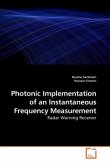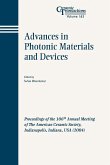

Broschiertes Buch
Radar Warning Receiver
2010
VDM Verlag Dr. Müller
Ähnliche Artikel

Broschiertes Buch
Using Metamaterials, High Temperature Superconductors, and Ferroelectric Materials
31. März 2016
LAP Lambert Academic Publishing

Broschiertes Buch
Microstrip Coupled Line Couplers
12. Dezember 2018
LAP Lambert Academic Publishing

Gebundenes Buch
2003
30. September 2003
Springer / Springer US / Springer, Berlin
978-1-4020-7610-7

Broschiertes Buch
6. März 2019
Cuvillier / Cuvillier Verlag

Broschiertes Buch
Design and Applications
21. Mai 2010
LAP Lambert Academic Publishing

27,99 €
Versandfertig in 6-10 Tagen
Broschiertes Buch
The Mathematical Model for WDM Systems
18. Februar 2015
LAP Lambert Academic Publishing

Broschiertes Buch
Proceedings of the 106th Annual Meeting of the American Ceramic Society, Indianapolis, Indiana, USA 2004
1. Mai 2005
Wiley


Broschiertes Buch
It's application in Optical Coherence Tomography
Aufl.
2012
LAP Lambert Academic Publishing

Ähnlichkeitssuche: Fact®Finder von OMIKRON
